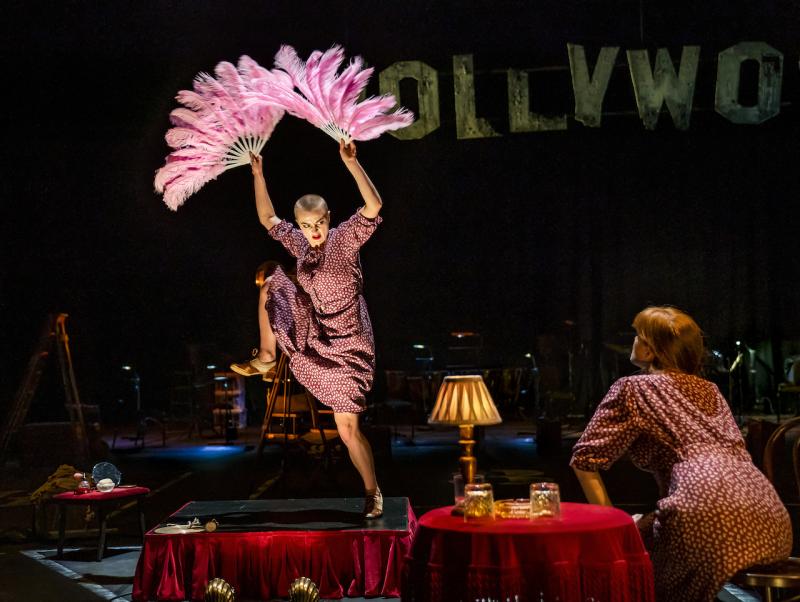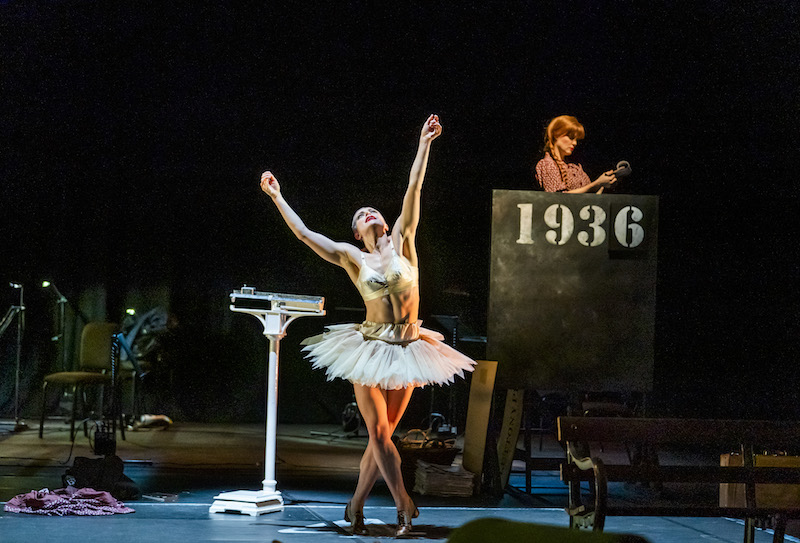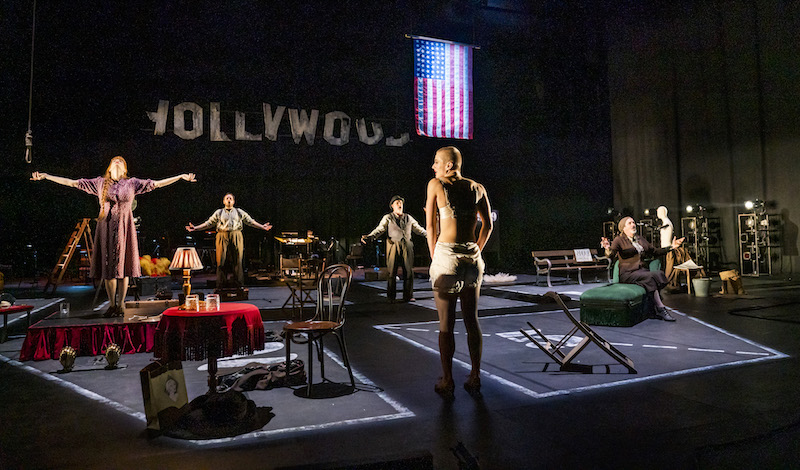The Seven Deadly Sins, Opera North online review - viscerally thrilling | reviews, news & interviews
The Seven Deadly Sins, Opera North online review - viscerally thrilling
The Seven Deadly Sins, Opera North online review - viscerally thrilling
Kurt Weill and Bertolt Brecht's indictment of capitalism in a vibrant new production

Theatres are currently banned from moving scenery and props about on stage and you might expect this to present a major obstacle to a production of The Seven Deadly Sins. How else is the opera’s protagonist to be seen to visit seven American cities, succumbing to a different sin in each?
This is Opera North’s first fully staged production since March and was originally intended as half of a double bill with Acis and Galatea. It was also, reasonably enough, conceived to play to a live audience at Leeds Playhouse’s Quarry Theatre but, again, there are gains from the new status quo. The last time I saw Sins (which was from a good seat in a prestigious opera house), I could discern less than half the words sung by the chorus, whose commentary on the action, in the manner of a Greek drama, is crucial to the biting satire Brecht intended. By contrast, filmed up close and carefully miked, every syllable has clarity in Opera North’s live streaming. Every visual nuance speaks volumes. Running at a brisk 35 minutes, the piece tells the story of Anna, who sets off on a seven-year journey across America to earn the wherewithall for her family to build a house. Torn between the pressure to make money and her moral scruples, Anna is presented as a split personality (pictured above). Anna I, the Irish-Canadian mezzo Wallis Giunta is the hard-nosed, pragmatic one, while Anna II, British dancer Shelley Eva Haden, is vulnerable, artistic, and increasingly worn down. Every attempt by Anna II to follow her heart meets harsh disaproval from Anna I who, taking her cue from her parents and brothers back home, chides Anna II for her sloth, pride, anger, gluttony, lust, greed and eventually (and most absurdly) envy, all of which, she reasons, get in the way of making money.
Running at a brisk 35 minutes, the piece tells the story of Anna, who sets off on a seven-year journey across America to earn the wherewithall for her family to build a house. Torn between the pressure to make money and her moral scruples, Anna is presented as a split personality (pictured above). Anna I, the Irish-Canadian mezzo Wallis Giunta is the hard-nosed, pragmatic one, while Anna II, British dancer Shelley Eva Haden, is vulnerable, artistic, and increasingly worn down. Every attempt by Anna II to follow her heart meets harsh disaproval from Anna I who, taking her cue from her parents and brothers back home, chides Anna II for her sloth, pride, anger, gluttony, lust, greed and eventually (and most absurdly) envy, all of which, she reasons, get in the way of making money.
The choreography, rather than slavishly illustrate each sin, takes its cue from the caustic vigour of Weill’s music
Morally, it’s all topsy turvy. In Memphis, where Anna II lands a job dancing in a cabaret, she is urged to give up her “pride” and give the public what they really want, which certainly isn’t her “artistic” dancing. In Boston, where Anna I rakes in the dosh by taking a rich lover, Anna II must give up her “lust” when it transpires that she’s sharing her meagre earnings with a poor man she loves. Keeping the Annas two metres apart could have fallen terribly flat were it not for the powerful articulacy of both performers, and the energy that crackles between them. It’s usual in productions of this work to show the pair frequently holding hands, suggesting a childish co-dependency. Obviously this couldn’t happen. Instead superego Anna I goads her “sister” to earn more, be more famous, be more compliant (“no one likes a girl who stands up to injustice”), with a scornful eye from a distance.
Gary Clarke’s choreography, rather than slavishly illustrating each sin, takes its cue from the caustic vigour of Weill’s music. The first sin, “sloth”, sees Anna II cavorting and cartwheeling over and around a park bench – hyperactive if anything. Adapting her cabaret performance the better to please the punters, Anna II exposes her satin drawers in an angry bump and grind routine, painful in its desperation. With each new city, her movements become yet more frenetic and ungainly, as Anna’s spirit is ground down by her experiences. Along the way there are jazz-age dance references for the spotting, most obviously a savage traducing of Anna Pavlova’s Dying Swan, and elsewhere echoes of Charleston and tango, and music hall hits such as the Sand Dance. The spatial challenge of moving the action from city to city is met (design is by George Johnson-Leigh) in the simplest of ways: by marking out the floor in numbered lots (pictured above) to which the girls simply walk, lugging their suitcases. Helpful signage is everywhere, informing us of the year, the place, the sin. Even the family chorus have name tags, and overarching the orchestra is a crumbling Hollywood logo in case anyone's in danger of missing the general theme of over-reaching ambition and moral decay.
The spatial challenge of moving the action from city to city is met (design is by George Johnson-Leigh) in the simplest of ways: by marking out the floor in numbered lots (pictured above) to which the girls simply walk, lugging their suitcases. Helpful signage is everywhere, informing us of the year, the place, the sin. Even the family chorus have name tags, and overarching the orchestra is a crumbling Hollywood logo in case anyone's in danger of missing the general theme of over-reaching ambition and moral decay.
Vocally, Wallis Giunta is at the top of her game, thrillingly firm of tone and steely of diction. She looks fabulous too, with her mane of red hair plaited into a braid so long and lush you think it must be a wig till you go to her biog photos online. Her “twin” Shelley Eva Haden’s buzz cut makes a nice distinction, given the pair’s matching tea dresses.
The chorus, actually a male quartet, the bass voice cast as Mother, is the only casualty of the two-metre rule. Their intonation goes woefully astray in the acapella sections where Weill uses the family, mock hymn-style, to expound their warped moral code and to complain that the daughter isn’t sending home nearly enough money. Their diction is faultless throughout.
This production, unusually, attempts to give Anna’s family a context (the libretto tells us nothing). Here, by hints of costume and gesture, we get that they are newly arrived immigrants in America, specifically European Jews. Yet this specificity isn’t borne out by anything Anna I says or thinks, and merely muddies the waters. What struck me forcibly about the family's cold-hearted capitalism on this viewing was that this is Trumpism, through and through. Making it in the world, or being seen to make it, is what counts in life, and perhaps, just perhaps, Opera North missed a trick in not connecting the aspirant America of 1930 to the MAGA-cap-wearing America of now.
Kurt Weill specialist James Holmes conducts the pared-down band with verve, nimbleness, and due attention to the music’s tragic undertow. No closing C major chord has ever sounded less jubilant than the one that ends this opera.
The future of Arts Journalism
You can stop theartsdesk.com closing!
We urgently need financing to survive. Our fundraising drive has thus far raised £49,000 but we need to reach £100,000 or we will be forced to close. Please contribute here: https://gofund.me/c3f6033d
And if you can forward this information to anyone who might assist, we’d be grateful.

Subscribe to theartsdesk.com
Thank you for continuing to read our work on theartsdesk.com. For unlimited access to every article in its entirety, including our archive of more than 15,000 pieces, we're asking for £5 per month or £40 per year. We feel it's a very good deal, and hope you do too.
To take a subscription now simply click here.
And if you're looking for that extra gift for a friend or family member, why not treat them to a theartsdesk.com gift subscription?

Add comment